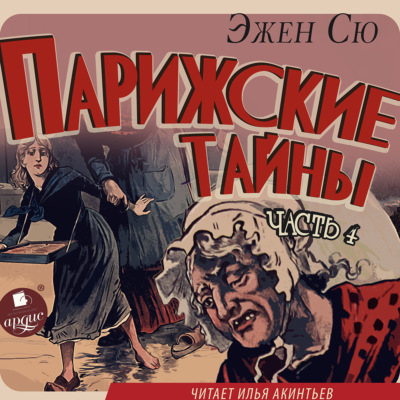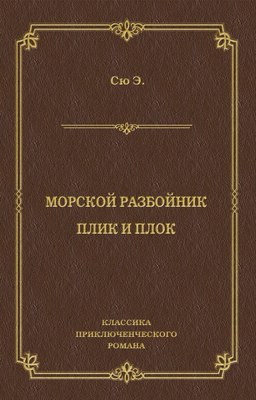Czytaj książkę: «Avarice - Anger: Two of the Seven Cardinal Sins»
THE MILLIONAIRES
AVARICE
CHAPTER I.
AN UNFORTUNATE CHOICE
The narrow street known for many long years as the Charnier des Innocents (the Charnel-house of the Innocents), near the market, has always been noted for the large number of scriveners who have established their booths in this densely populated part of Paris.
One fine morning in the month of May, 18 — , a young girl about eighteen years of age, who was clad in working dress, and whose charming though melancholy face wore that peculiar pallor which seems to be a sort of sinister reflection of poverty, was walking thoughtfully down the Charnier des Innocents. Several times she paused as if in doubt in front of as many scriveners' booths, but either because the proprietors seemed too young or too unprepossessing in appearance or too busy, she went slowly on again.
Seeing, in the doorway of the last booth, an old man with a face as good and kind as it was venerable, the young girl did not hesitate to enter the modest little establishment.
The scrivener, struck in his turn by the young girl's remarkable beauty and modest bearing, as well as her timid and melancholy air, greeted her with almost paternal affability as she entered his shop, after which he closed the door; then drawing the curtain of the little window, the good man motioned his client to a seat, while he took possession of his old leather armchair.
Mariette — for that was the young girl's name — lowered her big blue eyes, blushed deeply, and maintained an embarrassed, almost painful, silence for several seconds. Her bosom rose and fell tumultuously under the small gray shawl that she wore over her faded calico gown, while the hands she had clasped in her lap trembled violently.
The old scrivener, anxious to reassure the poor girl, said to her, almost affectionately, "Come, come, my child, compose yourself. Why should you feel this embarrassment? You came to ask me to write some request or petition for you, or, perhaps, a letter, did you not?"
"Yes, monsieur, it was — it was to ask you to write a letter for me that I came."
"Then you do not know how to write?"
"No, monsieur," replied Mariette, blushing still more deeply, as if ashamed of her ignorance, whereupon the scrivener, regretting that he had thus humiliated his client, said, kindly:
"You certainly cannot suppose me capable of blaming you for your ignorance. On the contrary, it is a sincere compassion I feel for persons who, for want of an education, are compelled to come to me, to apply to a third party, who may betray their confidence, and, perhaps, even ridicule them! And yet they are compelled to confide their dearest and most secret thoughts to these strangers. It is very hard, is it not?"
"It is, indeed, monsieur," replied Mariette, touched by these words. "To be obliged to apply to a stranger to — "
The young girl did not finish the sentence, but blushed deeply, and her eyes filled with tears.
Gazing at his youthful client with even greater interest, the scrivener said:
"Do not be so troubled, my child. You have neither garrulousness nor ridicule to fear from me. I have always regarded as something indescribably touching and sacred the confidence which persons who have been deprived of the advantages of an education are obliged to repose in me."
Then, with a kindly smile, he added: "But pray do not suppose for one moment, mademoiselle, that I say this to glorify myself at the expense of my confreres, and to get their clients away from them. No, I am saying exactly what I think and feel; and at my age, one certainly may be allowed to do that."
Mariette, more and more surprised at the old man's words, said, gratefully:
"I thank you, monsieur; you relieve me very much by thus understanding and excusing my embarrassment. It is very hard not to know how to read and write," she added, sighing," but, alas! very often one cannot help it."
"I am sure, my poor child, that in your case, as in the case of many other young girls who apply to me, it is not the good-will but the opportunity that is lacking. Many of these young girls, from being obliged to take care of their young brothers and sisters while their parents are busy away from home, have had no chance to attend school. Others were apprenticed at an early age — "
"Like myself, monsieur," said Mariette, smiling. "I was apprenticed when I was only nine years old, and up to that time I had been obliged to remain at home and take care of a little brother, who died a short time before my father and mother."
"Poor child! your history is very similar to that of most young girls of your station in life. But, since your term of apprenticeship expired, have you made no effort to acquire a little education?"
"Since that time I have had to work all day and far into the night to earn enough to keep my godmother and myself alive, monsieur," said Mariette, sadly.
"Alas! yes, time is bread to the labourer, and only too often he has to choose whether he shall die of hunger or live in ignorance."
Then, becoming more and more interested, he added: "You spoke of your godmother just now; so your father and mother are both dead, I suppose?"
"Yes, as I told you a little while ago," replied Mariette, sadly. "But pardon me, monsieur, for taking up so much of your time instead of telling you at once what I want you to write for me."
"I am sure my time could not have been better spent, for I am an old man, and I have had a good deal of experience, and I feel sure that you are a good and worthy girl. But now about the letter. Do you prefer to give me a rough idea of what you wish to write and let me put it in my own words, or do you prefer to dictate the letter?"
"I would rather dictate it, monsieur."
"Then I am ready," said the old man, putting on his spectacles, and seating himself at his desk with his eyes fixed upon the paper so as not to increase his client's embarrassment by looking at her.
So, after a moment's hesitation, Mariette, with downcast eyes, proceeded to dictate, as follows:
"Monsieur Louis."
On hearing this name, the old scrivener made a slight movement of surprise, — a fact that was not noticed by Mariette, who repeated, in a less trembling voice this time, "Monsieur Louis."
"I have written that," said the scrivener, still without looking at Mariette, whereupon the latter continued, hesitating every now and then, for, in spite of her confidence in the old man, it was no easy matter to reveal her secret thoughts to him:
"I am greatly troubled, for I have heard nothing from you, though you promised to write me while you were away."
"While you were away," repeated the scrivener, whose face had suddenly become thoughtful, and who was saying to himself, with a vague anxiety: "This is a singular coincidence. His name is Louis, and he is away."
"I hope you are well, M. Louis," Mariette continued, "and that it is not on account of any illness that you have not written to me, for then I should have two causes of anxiety instead of one.
"To-day is the sixth of May, M. Louis, the sixth of May, so I could not let the day pass without writing to you. Perhaps the same thought will occur to you, and that day after to-morrow I shall receive a letter from you, as you will receive one from me. Then I shall know that it was not on account of forgetfulness or sickness that you have delayed writing to me so long. In that case, how happy I shall be! So I shall wait for day after to-morrow with great impatience. Heaven grant that I may not be disappointed, M. Louis."
Mariette stifled a sigh as she uttered these last words, and a tear rolled down her cheek.
A long pause followed. The features of the scrivener who was bending over his desk could not be seen by the young girl, but they were assuming a more and more anxious expression; and two or three times he tried to steal a furtive glance at his client, as if the interest he had felt in her had given place to a sort of distrust caused by grave apprehensions on his part.
The young woman, keeping her eyes still fixed upon her lap, continued:
"I have no news to tell you, M. Louis. My godmother is still very ill. Her sufferings seem to increase, and that renders her much more irritable. In order that I may be with her as much as possible, I sew at home now most of the time, instead of going to Madame Jourdan's, so the days seem long and gloomy; for the work done in the shop with my companions was almost a pleasure, and seemed to progress much more rapidly. So I am obliged to work far into the night now, and do not get much sleep, as my godmother suffers much more at night than in the daytime, and requires a great deal of attention from me. Sometimes I do not even wake when she calls me because I am so dead with sleep, and then she scolds, which is very natural when she suffers so.
"You can understand, of course, that my life at home is not very happy, and that a friendly word from you would be a great comfort, and console me for many things that are very unpleasant.
"Good-bye, M. Louis. I expected to have written to you through Augustine, but she has gone back to her home now, and I have been obliged to apply to another person, to whom I have dictated this letter. Ah, M. Louis, never have I realised the misfortune of not knowing how to read or write as much as I do at this present time.
"Farewell, M. Louis, think of me, I beg of you, for I am always thinking of you.
"With sincere affection I once more bid you adieu."
As the young girl remained silent for a minute or two after these words, the old man turned to her and asked:
"Is that all, my child?"
"Yes, monsieur."
"And what name is to be signed to this letter?"
"The name of Mariette, monsieur."
"Mariette only?"
"Mariette Moreau, if you think best, monsieur. That is my family name."
"Signed, Mariette Moreau," said the old man, writing the name as he spoke.
Then, having folded the letter, he asked, concealing the secret anxiety with which he awaited the girl's reply:
"To whom is this letter to be addressed, my child?"
"To M. Louis Richard. General delivery, Dreux."
"I thought as much," secretly groaned the old man, as he prepared to write the address Mariette had just given him.
If the young girl had not been so deeply preoccupied she could hardly have failed to notice the change in the expression of the scrivener's face, — a change which became still more noticeable when he discovered for a certainty for whom this missive was intended. It was with a look of positive anger now that he furtively watched Mariette, and he seemed unable to make up his mind to write the address she had just given him, for after having written upon the envelope the words, "To Monsieur," he dropped his pen, and said to his client, forcing a smile in order to conceal alike his resentment and his apprehensions:
"Now, my child, though this is the first time we ever saw each other, it seems to me you feel you can trust me a little already."
"That is true, monsieur. Before I came here, I feared I should not have the courage to dictate my letter to an entire stranger, but your manner was so kind that I soon got over my embarrassment."
"I certainly see no reason why you should feel the slightest embarrassment. If I were your own father, I could not find a word of fault with the letter you have just written to — to M. Louis, and if I were not afraid of abusing the confidence you say that you have in me, I should ask — but no, that would be too inquisitive."
"You would ask me what, monsieur?"
"Who this M. Louis Richard is?"
"That is no secret, monsieur. M. Louis is the clerk of a notary whose office is in the same building as the shop in which I work. It was in this way that we became acquainted on the sixth of May, just one year ago to-day."
"Ah! I understand now why you laid such stress upon that date in your letter."
"Yes, monsieur."
"And you love each other, I suppose, — don't blush so, child, — and expect to marry some day, probably?"
"Yes, monsieur."
"And M. Louis's family consents to the marriage?"
"M. Louis has no one but his father to consult, and we hope he will not refuse his consent."
"And the young man's father, what kind of a person is he?"
"The best of fathers, M. Louis says, and bears his present poverty with great courage and cheerfulness, though he used to be very well off. M. Louis and his father are as poor now, though, as my godmother and I are. That makes us hope that he will not oppose our marriage."
"And your godmother, my child, — it seems to me she must be a great trial to you."
"When one suffers all the time, and has never had anything but misfortunes all one's life, it is very natural that one should not be very sweet tempered."
"Your godmother is an invalid, then?"
"She has lost one of her hands, monsieur, and she has a lung trouble that has confined her to the bed for more than a year."
"Lost her hand, — how?"
"She used to work in a mattress factory, monsieur, and one day she ran a long, crooked needle into her hand. The wound became inflamed from want of care, for my godmother had not time to give it the attention it should have had, and the doctors were obliged to cut her arm off. The wound reopens now and then, and causes her a great deal of pain."
"Poor woman!" murmured the scrivener, absently.
"As for the lung trouble she has," continued Mariette, "many women who follow that trade contract the disease, the doctors say, from breathing the unwholesome dust from the old mattresses they make over. My godmother is bent almost double, and nearly every night she has such terrible fits of coughing that I have to hold her for hours, sometimes."
"And your godmother has nothing but your earnings to depend on?"
"She cannot work now, monsieur, of course."
"Such devotion on your part is very generous, I must say."
"I am only doing my duty, monsieur. My godmother took care of me after my parents died, and paid for a three years' apprenticeship for me. But for her, I should not be in a position to earn my living, so it is only right that she should profit now by the assistance she gave me years ago."
"But you must have to work very hard to support her and yourself?"
"Yes; I have to work from fifteen to eighteen hours a day, monsieur."
"And at night you have to nurse her instead of taking the rest you so much need?"
"Who else would nurse her, monsieur?"
"But why doesn't she try to get into some hospital?"
"They will not take her into a hospital because the lung trouble she has is incurable. Besides, I could not desert her like that."
"Ah, well, my child, I see that I was not mistaken. You are a good, noble-hearted girl, there is no doubt of it," added the old man, holding out his hand to Mariette.
As he did, either through awkwardness, or intentionally, the scrivener overturned the inkstand that stood on his desk in such a way that a good part of the contents ran over the letter, which lacked only the address to complete it.
"Good heavens! How unfortunate, the letter is covered with ink, monsieur!" exclaimed Mariette.
"How awkward in me!" responded the old man, with a disgusted air. "Still, it doesn't matter very much, after all. It was a short letter. I write very rapidly, and it will not take me more than ten minutes to copy it for you, my child. At the same time, I will read it aloud so you can see if there is any change you would like to make in it."
"I am truly sorry to give you so much trouble, monsieur."
"It serves me right, as it was all my fault," responded the old man, cheerfully.
And he began to read the letter aloud as he wrote, exactly as if he were recopying it, as he proceeded with the reading. Nevertheless, from the scrivener's manner it seemed evident that a violent struggle was going on in his breast, for sometimes he sighed and knit his brows, sometimes he seemed confused and kept his eyes sedulously averted from the ingenuous face of Mariette, who sat with one elbow resting upon the table, and her head supported on her hand, watching with envious eyes the rapid movements of the old man's pen, as it traced characters which were undecipherable to her, but which would, as she fondly supposed, convey her thoughts to the man she loved.
The young girl expressing no desire to make the slightest change in her artless missive, the scrivener handed it to her after having carefully sealed it.
"And now, monsieur, how much do I owe you?" timidly inquired the girl, drawing a little purse containing two small silver corns and a few sous from her pocket.
"Fifty centimes," replied the old man after a moment's hesitation, remembering, perhaps, that it was at the cost of a day's bread that the poor girl was writing to her lover; "fifty centimes," repeated the scrivener, "for you understand, of course, my child, that I expect you to pay for only one of the letters I have written. I alone am responsible for my awkwardness."
"You are certainly very honest, monsieur," said Mariette, touched by what she considered a proof of generosity on the part of the scrivener. Then, after having paid for her letter, she added:
"You have been so kind to me, monsieur, that I shall venture to ask a favour of you."
"Speak, my child."
"If I have any other letters to write, it would be almost impossible for me to apply to any one but you, monsieur."
"I shall be at your service."
"But this is not all, monsieur. My godmother is as I am. She can neither read nor write. I had a friend I could depend upon, but she is out of town. In case I should receive a letter from M. Louis, would you be kind enough to read it to me?"
"Certainly, my child. I will read your letters to you with pleasure. Bring them all to me," replied the old man, with much inward gratification. "It is I who should thank you for the confidence you manifest in me. I hope I shall soon see you again, and that you leave here much more easy in mind than when you came."
"I certainly could not expect such kindness as you have shown me from any one else."
"Farewell, then, my child, and be sure that you consider me your reader and secretary henceforth. It really seems as if we must have known each other a dozen years."
"That is true, monsieur. Au revoir."
"Au revoir, my child."
Mariette had hardly left the booth when a postman appeared in the doorway, and holding out a letter to the old scrivener, said, cordially:
"Here, Father Richard, is a letter from Dreux."
"A letter from Dreux!" exclaimed the old man, seizing it eagerly. "Thank you, my friend." Then, examining the handwriting, he said to himself: "It is from Ramon! What is he going to tell me? What does he think of my son? Ah! what is going to become of all the fine plans Ramon and I formed so long ago?"
"There are six sous to pay on it, Father Richard," said the postman, arousing the old scrivener from his reverie.
"Six sous! the devil! isn't it prepaid?"
"Look at the stamp, Father Richard."
"True," said the scrivener, sighing heavily, as he reluctantly drew the ten sous piece he had just received from his pocket and handed it to the postman.
While this was going on, Mariette was hastening homeward.




















